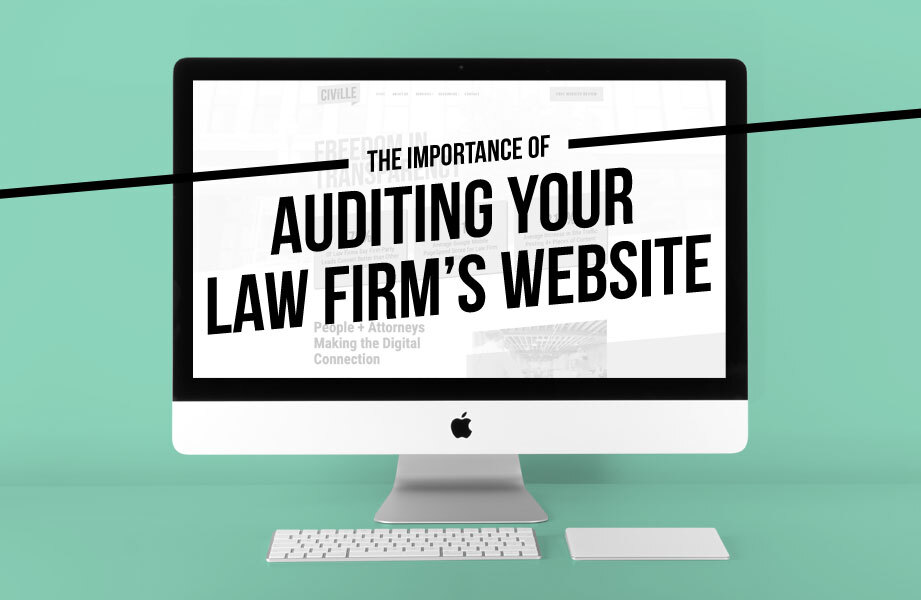
Investing in digital and working with vendors is often a big step with many law firms. It can be a scary thing when you’re switching from one vendor to another too; after all, there are many out there. Choosing the right law firm partner is critical because if you don’t, you could be setting up your law firm for failure or wasting money. As a vendor in the legal space, we at Civille like to think that we are that right partner. It’s our goal to always ensure we do things the right way, and the best way for your law firm. And at the end of it, make sure you’re getting a valuable and affordable service that provides your firm ROI.
But being in the law firm space, and in digital marketing/web design over the last 10+ years, we’ve seen some pretty scary things. Scary things in the strategies some law firms and other businesses employ (or don’t employ). Frightening website designs and terrifying SEO strategies. And some spine-chilling invoices at the end of it all. What’s even scarier is that many of these “scary things” law firms do in digital, they aren’t aware of. And they aren’t aware because they are either fed the wrong information, don’t care about their website, and/or aren’t working with the right partner.
As you’re (re-)evaluating your digital marketing, websites, and vendors alike, beware of these tricks and mistakes. Let’s take a closer look!
One-Time Website Build Cost (With No Ongoing Support)
If you’ve built a website with a vendor or web design company before, more often than not, you paid a relatively large upfront cost. And if you are evaluating vendors and are re-building or building a new site, you’re most likely going to find the same thing. You might be thinking, “So what’s wrong with that?” Here are the problems:
One-time build costs are more often than not inflated. The work that goes into building a site can be a lot, but most vendors/contractors are not building your site from scratch. They either use a WordPress template or templates they’ve already built. And that may be fitting for your firm in some ways, but the price is often way too much for the value you get in return.
The other problem is once a site is done, more often than not there’s no ongoing support. And you might be thinking, “well sure, but I don’t make many changes. My site is fine. I pay for cheap hosting and I don’t need support.” But that mentality and/or the one-time build costs is the reason why many law firm sites are behind. With no ongoing support and good hosting sites can quickly become outdated. Updating plugins, imagery, and everything else in between is ignored. Sites become stagnant and slow.
Why Do You Need to “Own” Your Site Completely?
Owning a site sounds fine and dandy, but why do you need to own it? Most firms don’t own their buildings? Most firms don’t own the software they use to manage clients? Owning a site means nothing if you aren’t going to continue to optimize and maintain it. Even if you think you have the resources to maintain it, most struggle to maintain good speeds and fail to modernize and keep up with the constant changes from search engines. Ownership matters when it comes to other things like your imagery, content, and anything that might be proprietary to you. But the bare bones behind a site in all reality doesn’t need to be owned.
In the end, leasing or using a subscription model vendor can be much more beneficial in the short term and long term. Beware of one-time upfront costs, and look for vendors and partners (like Civille) that will support, maintain, and grow your site beyond initial build.
Insanely Cheap Subscription-Based Website Packages
You might be thinking after reading the last paragraph, “Well this is contradictory.” But let me explain.
There are some vendors out there that don’t charge large up-front costs and use a subscription-based website model for their ongoing services. More often than not, that’s in your best interest for the many reasons I explained above. However, there are some relatively inexpensive options out there, where you pay a very low price–$99/$199 a month. And you get this brand spanking new site, ongoing support, and everything else in between. You might be thinking, “Well what’s wrong with that?”
And if you’re one of those firms vetting these particular large vendors or using them today (you might know who I’m talking about), it’s a trap. They are cheap for a reason, and when you pay for cheap things, you get cheap service and a cheap website. And what you’ll find with a vendor offering this, is that your site will most likely be the same as the majority of their clients.
In today’s digital world, you need to be setting yourself up for success by making your business unique. You need to be personable with your potential clients, and you need to be different from all the other law firms out there. And that all starts with your digital presence and your law firm’s website design. If you go with a cheap vendor, you’re going to get a cheap product and you’re going to be like everyone else out there. Don’t be tricked into thinking a lower cost means better value for your law firm.
Recurring SEO Services (With No Deliverables)
SEO is often a loosely used term in the digital world. Most law firms know they need it. And find themselves working with a vendor or looking for a vendor to do it. The problem is we often see vendors “providing” SEO, but they aren’t actually providing any SEO deliverables.
If you’re vetting vendors or evaluating your current vendor, make sure you’re paying for something you actually need, and that the work they are doing (if they are doing the work) is clear to you. SEO services can come in many forms, but at least make sure you’re getting deliverables with what you’re paying for. Here are some examples of the deliverables you should be getting in some manner with SEO services:
Common SEO Deliverables
- Content marketing – Most vendors may not rope content marketing into SEO services, but it’s an important piece if you’re trying to build your SEO strategy. If it’s not included, ask for it. And if it is, make sure you’re getting quality content that is valuable to your firm and your customers.
- Link building – Link building is often sold as an SEO service or with an SEO package. If it’s included or discussed, ask for reporting or deliverables on that strategy. Inter-linking is one thing, but building external links should also be something you look for with link building services.
- Frequent SEO audits – Auditing your website should be something that is done frequently. Errors can happen, links can break, and page speed can decrease over time on any site. By performing SEO audits, you can easily identify errors and take action to fix them. If a vendor is performing audits, make sure they are acting on the errors and warnings. It may be in your best interest to also perform regular audits to make sure you are holding your vendors accountable.
- Local Listings Management – Local listings are a great way to build external links to your site. They also offer high visibility for your firm to people looking for legal help on search engines. Google My Business, Bing Places, Yelp, and other directories are often things vendors set up and/or manage with local listings. If you’re getting this service, again ask for reporting, deliverables, and make sure that your listings are maintained. Managing listings should include responding to reviews, increasing visibility (in search results), posts, and your business info is relevant.
Reporting (That’s Not Fully Transparent)
Your Reporting is one of the most important pieces when it comes to your online presence. Reporting connects the dots. It encourages ownership and accountability. It helps you make appropriate decisions about your online efforts, marketing, and everything else in between. It’s the key to your firm’s success.
The problem with reporting in digital is there can be a lot to report on. And different ways to report on things. And different ways to hide things. As a decision maker, it’s crucial that you’re getting the right information to make decisions. And it’s crucial if you’re working with a vendor, that they are providing you with the right information.
Too often do we see reporting lacking when it comes to websites and digital marketing from agencies and website vendors alike. Missing pieces of information, wrong data, and/or not being fully transparent behind the metrics and the work that’s being done. Or even worse, when reporting, tracking, and tags aren’t set up or set up correctly. When working with a vendor you should not only be holding them accountable, but holding them accountable when it comes to reporting. Beware of those that don’t provide you with everything you need. And work with a vendor that is completely transparent behind everything they do and report on.
In Summary
Choosing a vendor is often a hard choice since there’s so many of them out there. And for the most part, the majority of them are good (like us at Civille). But make sure as you’re vetting, to choose one that has your best interest in mind. And look out for those that try to hide things and trick you into pricing that’s not beneficial for your firm.





